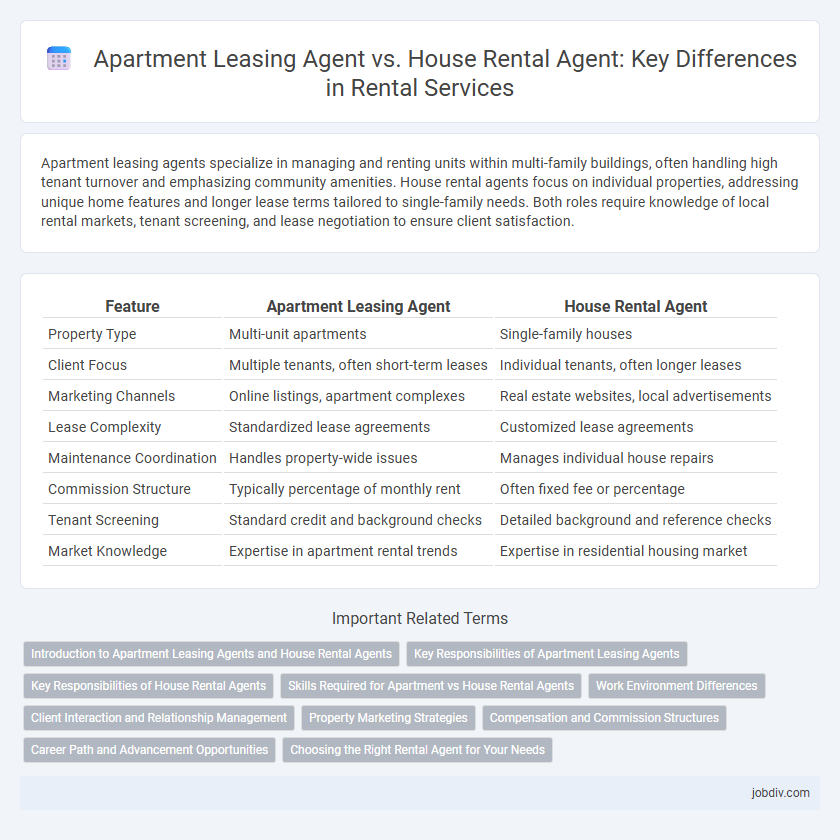Apartment leasing agents specialize in managing and renting units within multi-family buildings, often handling high tenant turnover and emphasizing community amenities. House rental agents focus on individual properties, addressing unique home features and longer lease terms tailored to single-family needs. Both roles require knowledge of local rental markets, tenant screening, and lease negotiation to ensure client satisfaction.
Table of Comparison
| Feature | Apartment Leasing Agent | House Rental Agent |
|---|---|---|
| Property Type | Multi-unit apartments | Single-family houses |
| Client Focus | Multiple tenants, often short-term leases | Individual tenants, often longer leases |
| Marketing Channels | Online listings, apartment complexes | Real estate websites, local advertisements |
| Lease Complexity | Standardized lease agreements | Customized lease agreements |
| Maintenance Coordination | Handles property-wide issues | Manages individual house repairs |
| Commission Structure | Typically percentage of monthly rent | Often fixed fee or percentage |
| Tenant Screening | Standard credit and background checks | Detailed background and reference checks |
| Market Knowledge | Expertise in apartment rental trends | Expertise in residential housing market |
Introduction to Apartment Leasing Agents and House Rental Agents
Apartment leasing agents specialize in managing rental units within multi-family residential buildings, coordinating tenant placement, lease agreements, and property tours. House rental agents focus on single-family homes, handling marketing, tenant screening, and lease negotiations tailored to individual properties. Both roles require in-depth knowledge of local rental laws, market trends, and effective communication skills to ensure occupancy and client satisfaction.
Key Responsibilities of Apartment Leasing Agents
Apartment leasing agents primarily manage marketing and leasing activities in multifamily residential settings, coordinating property showings and processing rental applications efficiently. They conduct thorough tenant screenings, enforce lease agreements, and address maintenance requests to ensure resident satisfaction and property upkeep. Their expertise in lease negotiation and tenant relations differentiates them from house rental agents, who typically focus on single-family home rentals.
Key Responsibilities of House Rental Agents
House rental agents specialize in managing lease agreements, tenant screenings, and property maintenance specifically for residential homes. They coordinate property showings, handle rent collection, and address tenant concerns to ensure smooth rental operations. Their expertise includes navigating local housing regulations and optimizing lease terms tailored to standalone houses.
Skills Required for Apartment vs House Rental Agents
Apartment leasing agents must excel in customer service, property marketing, and understanding of multi-unit building regulations, while also adept at managing high tenant turnover and complex lease agreements. House rental agents require strong negotiation skills, knowledge of single-family property maintenance, and familiarity with neighborhood dynamics to match tenants with appropriate homes. Both roles demand proficiency in communication, local housing laws, and rental software systems.
Work Environment Differences
Apartment leasing agents typically work within large residential complexes or property management offices, interacting with multiple tenants and handling high-volume leasing processes. House rental agents often operate independently or with smaller realty firms, focusing on individual properties and personalized client interactions. The work environment for apartment agents is more structured and fast-paced, while house rental agents experience greater variability and a more flexible schedule.
Client Interaction and Relationship Management
Apartment leasing agents specialize in managing client relationships within multifamily residential complexes, often using digital tools and community events to enhance tenant engagement and retention. In contrast, house rental agents typically offer personalized, one-on-one client interactions tailored to individual property needs, focusing on long-term tenant satisfaction and customized service. Both roles require strong communication skills but differ in scale and method of client relationship management based on the property type.
Property Marketing Strategies
Apartment leasing agents often utilize digital platforms, virtual tours, and targeted social media campaigns to attract high-density urban renters. House rental agents emphasize localized marketing strategies, such as community events and neighborhood partnerships, to highlight single-family home features and appeal to long-term tenants. Both leverage data analytics to optimize pricing and tenant demographics but tailor their approaches based on property type and target audience preferences.
Compensation and Commission Structures
Apartment leasing agents typically earn a combination of base salary and commissions based on the number of units leased or the total rental revenue generated, with commission rates often ranging from 3% to 6% of the monthly rent per lease secured. House rental agents generally receive commissions as a percentage of the annual lease amount, usually between 8% to 12%, reflecting the higher value and longer lease terms of individual homes. Both roles may include bonuses tied to occupancy goals, but apartment leasing agents benefit from volume-based earnings, while house rental agents often focus on higher-value individual transactions.
Career Path and Advancement Opportunities
Apartment leasing agents often experience faster career advancement due to the high volume of units and turnover rates in multi-family complexes, allowing for quicker skill acquisition and leadership roles in property management. House rental agents typically develop deeper local market expertise and build long-term client relationships, which can lead to specialized roles such as luxury home leasing or real estate brokerage. Both career paths offer opportunities for growth, but apartment leasing agents may progress into regional management or corporate positions more rapidly, while house rental agents tend to advance through personalized client services and market specialization.
Choosing the Right Rental Agent for Your Needs
Apartment leasing agents specialize in managing rental units within multi-family buildings, offering expertise in tenant screening and lease agreements specific to apartments. House rental agents focus on single-family homes, understanding neighborhood dynamics and property maintenance unique to residential neighborhoods. Choosing the right rental agent depends on your property type and rental goals, ensuring they possess the necessary market knowledge and negotiation skills for optimal results.
Apartment Leasing Agent vs House Rental Agent Infographic

 jobdiv.com
jobdiv.com